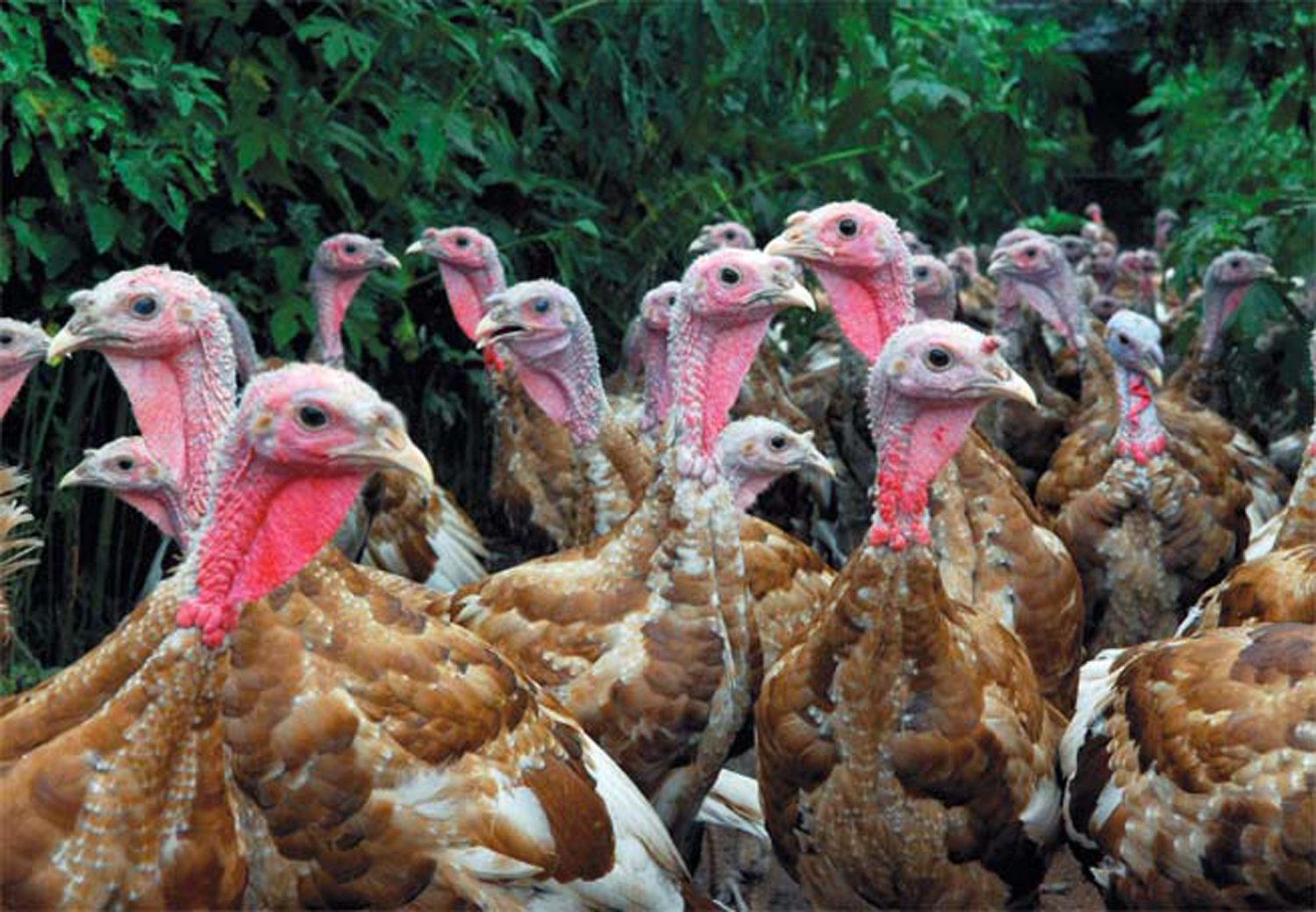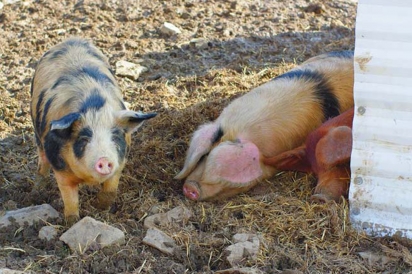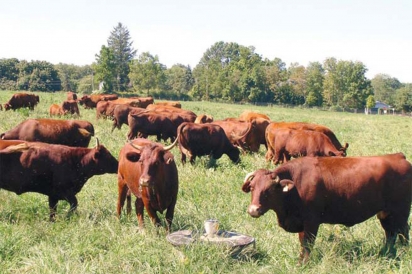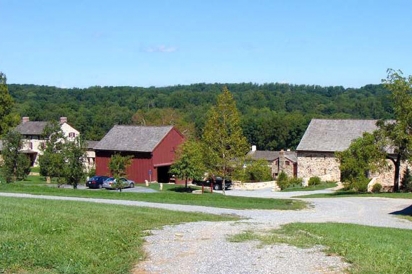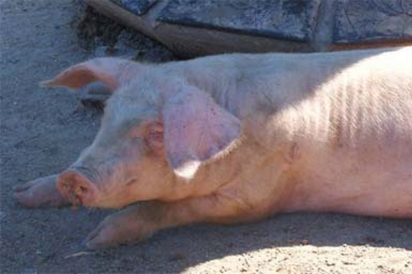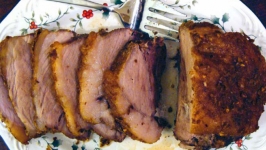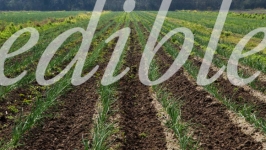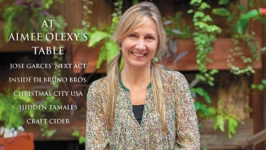Foodshed: A Grass-Fed Feast
Everyone knows that holiday meals are all about tradition. You can scour the internet all you want for hip new sidedish ideas and crafty place-card designs for the Thanksgiving table, but if you forget the pan gravy—or worse, the turkey— you just might have a mutiny on your hands. These family meals have been ingrained in our cultural heritage for centuries, and recipes for whole birds, hams and roasts have been passed from generation to generation like treasured heirlooms.
Over the past few years, heritage-breed turkeys like Bourbon Red and Narragansett have taken the Thanksgiving table by storm. These breeds were the livestock of our ancestors, and their popularization has pointed Americans to the other heritage livestock breeds in danger of extinction, such as Blue Andalusian chickens, Guernsey cattle and Berkshire pigs.
Because the animals are raised outside on pasture, heritage meats are much more flavorful and nutritious than the industrial meats that dominate the marketplace. And today, thanks to consumer-education campaigns and preservation efforts, heritage breeds are gaining traction once more in kitchens across the country. So this holiday season, as you look forward to your traditional family feast, why not bring some true heritage to the table?
THE BREEDS OF OUR ANCESTORS
Heritage breeds are traditional livestock breeds that have been around for hundreds and even thousands of years. Though there is no universally agreed-upon definition or USDA certification for “heritage” animals, the term refers to those breeds that have remained unaltered by commercial agriculture and retain their historical genetic attributes—such as disease and parasite resistance, heat (or cold) tolerance, good maternal instincts and foraging abilities.
For centuries, a wide variety of heritage cattle, pig, goat, sheep and poultry breeds were the mainstays of the American food system, but when large-scale factory farms entered the scene, things changed. Commercial farmers found that they could breed (and often genetically modify) animals to gain weight more quickly and produce higher yields in confined facilities. This more efficient model allowed for lower prices, and even though the new industrially produced meats were less flavorful than their heritage-breed counterparts, consumers grew accustomed to the cheaper, larger, more uniform cuts. As a result, the more expensive heritage livestock breeds (and the small-scale farmers who raised them) fell out of popular favor, and the genetic diversity of our agriculture system began to plummet.
Nowadays, a mere handful of industrial livestock breeds dominate the market, but with the help of the Slow Food movement and like-minded organizations across the country, heritage breeds— and small-scale farming—are making a comeback. “There’s all this marketing now about sustainable, grass-fed, pasture-raised meats,” says Kevin Tucker, farm manager at Philly CowShare, “and that will help bring heritage breeds back, because those were the breeds that were developed to be raised on grass and pasture in the first place.”
As public concerns about climate change, sustainability and environmental impact have grown from whispers to raging global conversations, small farms and the more genetically diverse animals that they raise have been getting more attention. Commercial livestock fatten up more quickly and cost much less to raise than heritage breeds, but they are often unable to reproduce on their own, are incredibly vulnerable to disease, and require hormones and cheap grain to reach their market weights.
Heritage-breed animals, on the other hand, adapt well to changing environments, are self-sufficient, and produce well on pasture, making them ideal choices for small farms. By raising heritage livestock breeds, farmers not only help to maintain variety within our livestock populations—they also preserve valuable traits within the species that will help future breeds endure harsh conditions.
The Livestock Conservancy, a group whose mission is to protect breeds in danger of extinction, includes ten different livestock species on its Conservation Priority List, but the four most commonly raised are turkeys, chickens, pigs and cattle.
TURKEYS
Heritage turkeys range drastically in size, shape and colorings—from the Narragansett’s large stature, crimson head and striking black-andwhite plumage to the Beltsville White’s petite size, bluish-red head and pure-white feathers. Because they are generally raised outside in a more natural environment, heritage breeds take nearly twice as long to mature as commercial breeds, but they’re well worth the wait (and added cost).
“The longer the bird has to grow naturally, the better it will taste,” says George Rude of Griggstown Quail Farm in Princeton, New Jersey. “My [Bourbon Reds] grow for six months plus. Their meat is a lot darker, and they’ve got much more flavor than birds that have only been around for 14 or 15 weeks.”
Heritage Turkey Breeds: Beltsville Small White, Chocolate, Jersey Buff, Lavender/Lilac, Midget White, Narragansett, White Holland, Black, Bourbon Red, Royal Palm, Slate, Standard Bronze, Broad- Breasted Bronze
CHICKENS
Like heritage turkeys, these traditional chicken breeds grow much more slowly than their commercial counterparts, which results in a bird with denser meat, less fat and more flavor. The Livestock Conservancy lists more than 50 heritage chicken breeds, ranging from the jet-black Australorp to the deep-red Buckeye and the powder-white Delaware.
Heritage Chicken Breeds: Holland, Buckeye, Cubalaya, Delaware, Java, Dominique, Jersey Giant, New Hampshire, Rhode Island White, Plymouth Rock, Rhode Island Red, Wyandotte, Iowa Blue
PIGS
Because heritage-breed pigs are typically raised outdoors, where they can get exercise and store fat for the winter, they produce pork that is darker, meatier, more tender and more marbled than what is commonly available in supermarkets today. Heritage breeds also vary widely in size, shape, and appearance, and their meats range from white to red and from lean to extremely fatty.
Heritage Pig Breeds: Choctaw, Gloucestershire Old Spots, Guinea Hog, Large Black, Mulefoot, Ossabaw Island, Red Wattle, Tamworth, Hereford, Saddleback
CATTLE
In the last few years, heritage cattle breeds have begun to regain their place in the livestock market, a development due to an increased consumer awareness of the benefits of grass-fed meat. “I didn’t start raising Devon cattle because they are a heritage breed,” says Dean Carlson of Wyebrook Farm in Chester County. “I began raising them because they do well on grass, and grass is a much more sustainable model. They are also easy to handle, and since they were traditionally dual-purpose—milk and meat—the calves get a lot of milk from the mothers, which makes them healthier animals.” While their industrial counterparts are larger-framed and generally grow to market weight in 14 to 16 months, heritage-breed cattle are smaller and take about two to three years to mature.
Heritage Cattle Breeds: Canadienne, Dutch Belted, Florida Cracker, Kerry, Milking Shorthorn, Milking Devon, Randall (aka Randall Lineback), Ancient White Park, Pineywoods, Red Poll, Ayrshire, Galloway, Guernsey, Ankole-Watusi, Belted Galloway, Devon (aka Beef Devon), Dexter, Highland, Chirikof Island, Criollo, Texas Longhorn
KNOW YOUR FARMER:
10 Farms Raising Heritage-Breed
Meat & Poultry in the Philly Area
7th HEAVEN FARM
Tabernacle, NJ
Heritage breeds: Dutch Belted, Galloway, and Highland cattle; Southdown and Dorset sheep; White Holland turkeys
7th Heaven Farm in Burlington County, New Jersey, is home to various diminishing and/or rare breeds of livestock, including Southdown “Babydoll” sheep; Dutch Belted, Galloway and Highland cattle; heritage-breed turkeys; miniature LaMancha and Boer goats; pasture-raised rabbits and ducks; and exotic guinea and peafowl. All their animals range freely throughout the farm’s seven and a half acres, grazing on pasture and browsing in the woods from spring through fall. During the winter months, they are still free to roam; however, their diet consists of various types of baled hay and grasses. 7th Heaven Farm sells beef, pork and egg shares year-round though a Family Share Program (FSP), and, when available, they also offer pastured chicken, duck, rabbit and turkey, and grass-fed lamb and goat. Visit their website for more information about the farm and pricing and ordering procedures.
BIRCHWOOD FARM & DAIRY
428 Brownsburg Rd.,
Newtown, PA
215.598.8633
Heritage breeds: Devon cattle; Tamworth pigs
Founded in 1943 by Howard Tierney and currently run by his grandson Mike Tierney, Birchwood Farm & Dairy has a long history of sustainable raising practices and production of highquality dairy products and meats. Now a Pennsylvania Certifi ed Organic (PCO) farm, they raise Jersey cows (for milking), Devon cows (for meat), Tamworth pigs and various breeds of chickens for both meat and eggs. Their pigs are pasture-raised on a diet that consists of full-time pasture, milk, alfalfa and crab apples (summer); acorns (fall); and organic corn and free-choice mineral supplement (winter). Their cattle are 100% grass-fed, and their chickens have access to a natural diet of grass, dirt and grubs on pasture. Birchwood’s organic raw milk and dairy products, grassfed beef, heritage-breed pork, and organic chicken and eggs are available for purchase at their on-site store. Visit their website for more information.
CANTER HILL FARM
2138 Valley Hill Rd.,
Malvern, PA
610.827.1594
Heritage breeds: Plymouth Rock chickens (crossed with Freedom Rangers, for meat) and Araucana hens (for eggs); Bourbon Red and Narragansett turkeys; Dorset, Suffolk, and Katahdin sheep
In 2008, when they founded Canter Hill Farm in Malvern, Pennsylvania, Wayne and Jeannette Grabe hoped to return to heirloom and heritage breeds raised without chemicals, fertilizers or antibiotics. Today, the couple raises a wide variety of chickens, turkeys, ducks, guinea hens, lambs and pigs—many of them heritage breeds. Their lambs are 100% grass-fed, and their pigs are fed produce scraps to supplement whatever they forage from the forest on their own. All of Canter Hill’s poultry birds are also raised on pasture, and their diets are supplemented with organic feed that is soy-free and low in corn content. Canter Hill Farm sells produce, eggs and meats at the farmers’ market in Bryn Mawr and also takes orders by email for pickup at the farm. Visit their website for more information.
COUNTRY TIME FARM
Mountain Rd.,
Hamburg, PA
610.562.2090
Heritage breeds: Large Black pigs
At Country Time Farm in Berks County, Paul and Ember Crivellaro raise heritage-breed Large Black hogs on natural grain in a happily humane setting. Originally called Devon or Cornwall pigs in their native England, these hardy, docile and friendly foraging hogs feed on pasture vegetation and grains. The Crivellaros take special pride in their hogs, and they distribute their pork products— which are all free of antibiotics, growth hormones, preservatives and MSG—to many of the top restaurants in Philadelphia, such as Amis, Vetri, Osteria, JG Domestic, Le Virtù, Southwark, Paradiso Restaurant and Wine Bar, Plenty, Serpico, South Philadelphia Tap Room, and American Sardine Bar. You can also fi nd their products at the Fair Food Farmstand in Reading Terminal Market, and at Greensgrow Farms.
DOUBLE BROOK FARM
130 Hopewell Rocky Hill Rd.,
Hopewell, NJ
609.466.3594
Heritage breeds: Devon cattle; Rhode Island Red chickens (for eggs); Ossabaw, Tamworth, Berkshire, and Old Spot pigs; Katahdin sheep; Narragansett, Black Spanish, Bourbon Red, Blue Slate, and Broad-Breasted Bronze turkeys
Located on over 800 acres of land in central Jersey, Double Brook Farm grows vegetables, fruit, herbs and fl owers using organic practices and raises cattle, pigs, sheep, chicken and turkeys on pasture. Farmers Robin and Jon McConaughy ensure that all their animals have some access to shelter but are primarily on the open land, moving often (sometimes twice a day) and foraging for part or all of their diet. Their beef and sheep are 100% grassfed, and the foraged diet of their pigs, chickens and turkeys is supplemented with a locally grown feed of corn, soybeans, fl ax, alfalfa and minerals. Double Brook’s meats and produce are sold exclusively at Brick Farm Market in Hopewell, New Jersey, and will soon be showcased at the Brick Farm Tavern, which is scheduled to open in 2014.
GRIGGSTOWN QUAIL FARM
484 Bunker Hill Rd.,
Princeton, NJ
908.359.5218
Heritage breeds: Bourbon Red turkeys
n 1973, George Rude founded Griggstown Quail Farm with just 12 quail on two acres of land. Nowadays, the farm has expanded to 70 acres, and Rude raises free-range, all-natural pheasants, quail, chicken, and when in season, Mallard and Muscovy ducks, Red Bourbon heritage turkeys, and partridges. The Griggstown Farm Market, located on the farm, sells fresh and frozen poultry along with choice farm-grown produce, chicken and turkey potpies, assorted fruit pies, cakes, cookies, hand pies and soups. They also sell their own freshly harvested vegetables, herbs and fl owers through a community-supported agriculture (CSA) program. Griggstown products are also used in more than 30 restaurants and sold in more than 50 retail markets in the tristate area.
MEADOW RUN FARMS
727 Rettew Mill Rd.,
Lititz, PA
717.733.4832
Heritage breeds: Highland and Devon–crossed cattle; Rhode Island Red and Barred Rock laying hens; Tamworth–Red Waddle hogs
Located in scenic Lancaster County, Meadow Run Farm produces humanely raised 100% grass-fed beef; pastured, GMOfree chicken, eggs, and turkey; and heritage-breed pork. Farmers Marcus and Sharon Horst ensure that their animals are not confi ned at any time in their growth cycle, and all their meat and poultry is free of hormones and antibiotics. The Horsts sell their meats and poultry at Meadow Run’s farm store, in addition to raw milk, cheeses, butter, maple syrup, raw honey and cooking oils. They also deliver their products to the Fair Food Farmstand in Reading Terminal Market, the Swarthmore Co-Op, and Martindale’s Natural Market in Springfi eld, Pennsylvania.
STRYKER FARMS
3045 Mountain Rd.,
Saylorsburg, PA
570.269.2995
Heritage breeds: Plymouth Barred Rock, Rhode Island Red, and Australorp chickens (for eggs); Tamworth pigs
Stryker Farm is a pasture-based livestock farm situated between the Lehigh Valley and the Pocono Mountains in Pennsylvania. On the farm’s 47 acres, Nolan Thevenet raises heritage Tamworth pigs, Kiko-cross goats and a mixed fl ock of Plymouth Rock, Rhode Island Red, Welsummer, Australorp, and Ameraucana laying hens. All of the animals enjoy low-stress outdoor environments and natural, non-GMO feeds, and Thevenet ensures that their pastures are never treated with chemical herbicides, pesticides or fertilizers. Stryker Farm’s goat meat and pork products are sold at the Fair Food Farmstand in Philadelphia’s Reading Terminal Market and the Chestnut Hill Farmers’ Market.
SWEET STEM FARMS
727 Rettew Mill Rd.,
Lititz, PA
717.733.4279
Heritage breeds: Devon and Dexter cattle (crossed with Angus, Hereford and Charolais breeds); Clun Forest lambs (crossed with Dorset and Polypay breeds); Hereford, Tamworth, Large Black, and Berkshire pigs (crossed with Large White, Landrace, Duroc, and Chester White breeds)
At Sweet Stem Farm in Lancaster County, Dee Horst-Landis and her husband Philip produce sustainably raised, hormone- and antibiotic-free beef, lamb and pork. Their sheep and beef cattle are kept on pasture during the spring, summer, and fall, and in the winter months they are given access to the shelter of a barn bedded with straw. Their pigs are raised on straw bedding in spacious, well-ventilated, greenhouse-style barns, which combine constant access to fresh air, room to run, and materials that support their natural rooting tendencies. Sweet Stem’s 100% grass-fed beef and sustainably raised lamb and pork are available for purchase at many local retailers and markets, including select Whole Foods Markets, the Fair Food Farmstand in Reading Terminal Market, the Green Aisle Grocery, Greensgrow Farm, Harvest Local Foods and Philly CowShare. Visit their website for a complete list of retail locations and local restaurants that feature their meats.
WYEBROOK FARM
150 Wyebrook Rd.,
Honey Brook, PA
610.942.7481
Heritage breeds: Devon and Scottish Highland cattle; Ossabaw, Old Spot, Berkshire, and Tamworth pigs At Chester County’s Wyebrook Farm, farmer Dean Carlson raises free-range cattle, pigs, and chickens on all-natural diets.
Wyebrook’s herd of grass-fed cattle—consisting of Red Angus and the heritage Devon and Scottish Highland breeds—are moved at least once a day to fresh pasture for maximum nutrition. The farm’s pigs—all heritage breeds—are raised in woodlots so they get exercise and can forage for food in addition to the rations the farm provides. The farm’s fl ocks of Freedom Ranger chickens (for meat) and Red Sex Link hens (for eggs) are raised on pasture and enjoy a diet of grains, grass, legumes and insects. Wyebrook’s on-site farm market sells hand-butchered beef, pork, and chicken, as well as stock, rendered lard, cured and smoked bacon, freshly ground burgers, and homemade hot dogs and sausages. Some of Wyebrook’s products are also sold in Philadelphia’s Green Aisle Grocery, and Wyebrook meats are often used at restaurants such as Russet, Talula’s Garden, and The Farm and Fisherman in Philadelphia, and at Restaurant Alba in Malvern.
HERITAGE-BREED HEROES
Awareness about heritage breeds and sustainable agriculture has grown in the last few years, thanks to the Slow Food movement and other advocacy groups and institutions. Although many heritage livestock breeds remain on the brink of extinction, organizations such as the ones below have made great strides in preserving rare breeds and educating consumers, farmers and chefs about the benefits of sustainably raised meats and poultry.
THE LIVESTOCK CONSERVANCY
Founded in 1977 in Pittsboro, North Carolina, the Livestock Conservancy (TLC) is one of the oldest organizations dedicated to heritage-breed preservation in the United States. For decades, TLC has been working with farmers, chefs, historians and consumers to increase genetic diversity in agriculture and ensure future generations of heritage-breed livestock. The organization provides educational materials, training and consultations to help farmers successfully raise rare breeds, and, in the absence of official USDA regulations and criteria, its guidelines for heritage-breed meats and poultry have become the industry standard.
SVF FOUNDATION
The Rhode Island–based SVF Foundation is dedicated to preserving heritage-breed livestock through cryopreservation. Since it was established in 1999, SVF—in collaboration with Tufts University—has collected and frozen about 75,000 samples of germoplasm (embryos and semen) from heritage-breed livestock, in the hopes that (if necessary) it will be able to restore a breed, with its full genetic diversity, within one generation. “People get it when it comes to dogs,” says Peter Borden, SVF’s executive director. “You’re not going to ask a silky terrier to do a German shepherd’s job. And it’s the same in animal agriculture. It’s important to keep the different heritage breeds on the hoof and give them a job so that we don’t lose the specific traits each one has to offer.”
HERITAGE FOODS USA
With more of a culinary vision, Slow Food USA launched Heritage Foods USA in 2001 to help market and sell endangered heritage-breed turkeys for the holiday season. They sold about 800 birds their first Thanksgiving, and two years later Heritage Foods gained its independence and began to market and sell other heritage meats and poultry to chefs across the country. Today, Heritage Foods moves over 50,000 pounds of heritage, pasture-raised, antibiotic-free meat through its wholesale and mail-order outlets, and it hopes to sell 10,000 turkeys for Thanksgiving this year. “It all started with getting people to understand where their food is coming from and how their meats are being raised,” says Catherine Greeley, director of mail order. “Our early customers were all about the mission [of heritage-breed preservation], but now customers come to us because they’ve heard about different breeds that are supposed to be really delicious.”
COCHON 555
Education was also the key motivator for Brady Lowe, who created the Cochon 555 tour in 2008 to tout the benefits and unique flavors of heritage-breed pork to chefs across the country. The 14-city tour, which connects chefs with small, local farms raising heritage-breed pigs, all began with a quest for knowledge. “I combed the web for information on heritage-breed pork, but there was very little out there,” he says. “So I did a ton of research and wrote a guide myself. And then I gave it away to chefs for free and published it on the internet. I started the conversation, and the Cochon tour is my way of keeping it going—sustaining the chatter about heritage breeds—and building connections between farmers and chefs.” So far, Lowe has directly paid over $400,000 to small, family farms and raised more than $270,000 to support related charities.
WHERE TO BUY HERITAGE
MEATS AND POULTRY
Ready to get your hands on some heritage-breed meats and poultry? Check with your local butcher; stop by any of Philadelphia’s farmers’ markets (for a complete listing, go to farmtocity.org); or visit one of these friendly shops, co-ops and online retailers.
FAIR FOOD FARMSTAND
Reading Terminal Market
12th and Arch Sts., Philadelphia
215.386.5211, ext. 120
GREEN AISLE GROCERY
1618 E. Passyunk Ave., Philadelphia
215.465.1411
HARVEST LOCAL FOODS
305 Windermere Ave., Lansdowne
484.461.7884
MARIPOSA FOOD CO-OP
4824 Baltimore Ave., Philadelphia
215.729.2121
MILK & HONEY MARKET
4435 Baltimore Ave., Philadelphia
215.387.6455
SWARTHMORE CO-OP
341 Dartmouth Ave., Swarthmore
610.543.9805
WEAVERS WAY CO-OP
Mount Airy:
559 Carpenter Lane, Philadelphia
215.843.2350
Chestnut Hill:
8424 Germantown Ave., Philadelphia
215.866.9150
WHOLE FOODS MARKETS
various locations


